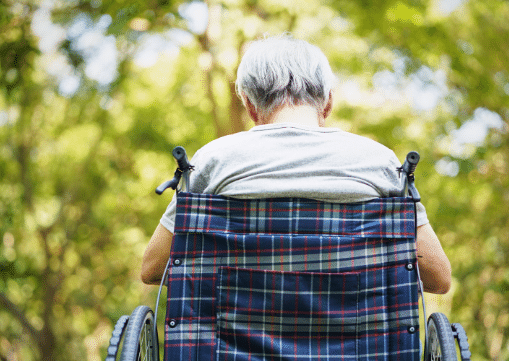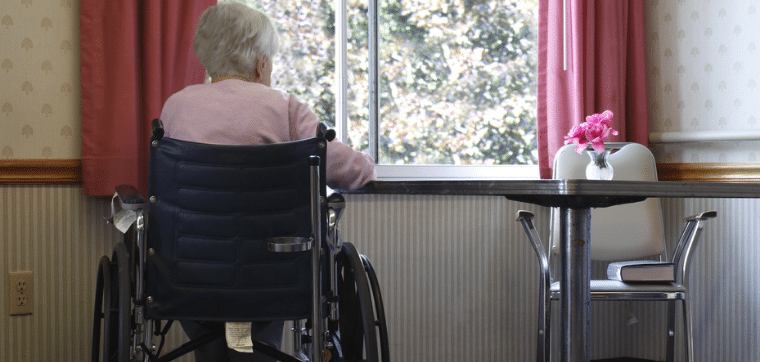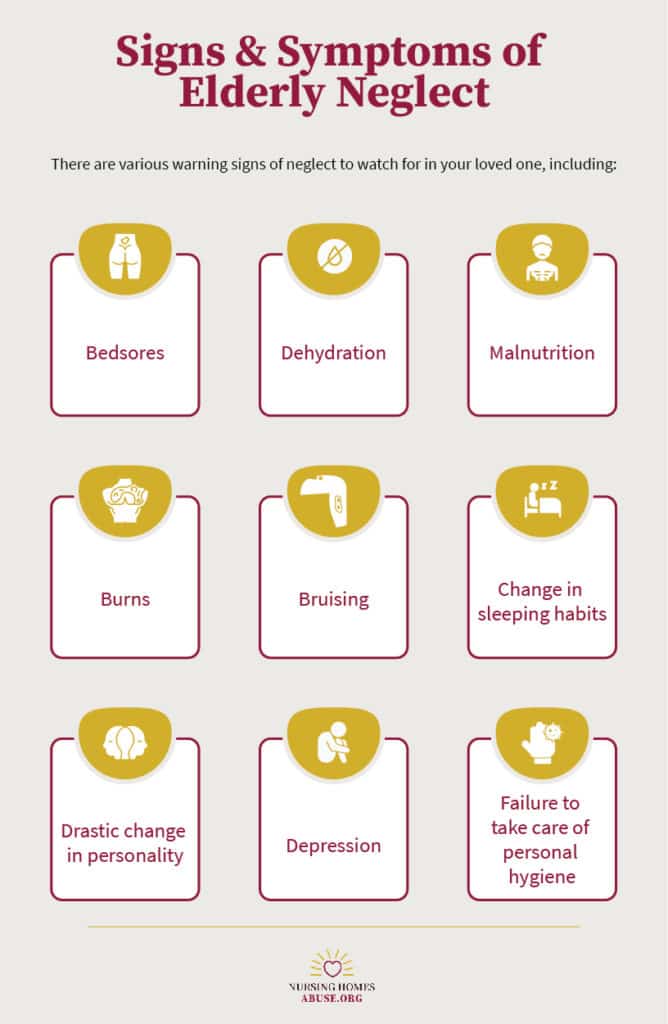Nursing Home Neglect - What is Neglect in Nursing Homes?
Neglect happens when a resident suffers from inadequate nursing care that results in illness, physical harm, mental anguish, or death. Fortunately, there are ways to help an elderly person who may be suffering from neglectful care in a long-term nursing facility.

Home ▸ Nursing Home Neglect
What is nursing home neglect?
Researchers and professionals in the medical community define nursing home neglect as “the refusal or failure of a caregiver to fulfill his or her obligations or duties to an older person, including …. providing any food, clothing, medicine, shelter, supervision, and medical care and services that a prudent person would deem essential for the well-being of another.”
Although that seems straightforward, nursing home injuries due to neglect is a common issue in the United States. Most nursing home staff members do their best to treat elderly residents with dignity and respect. Unfortunately, some nursing home staff members do not.
If you think your loved one might be a victim of nursing home neglect, you have a few options. You can talk to the nursing home care ombudsman and try to determine what’s happening. You may also call adult protective services.
If you’re not satisfied with the response, consider getting assistance from a nursing home neglect law firm. You may be entitled to financial compensation if your loved one was injured, neglected, abused, or died in a nursing home due to neglect.
Alternatively, the individual may be positioned improperly, which leads to the skin pulling or rubbing to the point of injury. A lack of airflow and hygiene further accelerates tissue death and increases the risk of infection.
What causes nursing home neglect?
The primary causes of nursing home neglect are similar to the causes of other forms of abuse in nursing homes. These include inadequate staffing, poor hiring practices, and substandard training.
Inadequate Staffing
Nursing home understaffing is a serious issue in the United States, and the advent of COVID-19 has worsened the situation. Inadequate staffing can cause staff members who are working to feel overworked, underpaid, and stressed out.These factors can contribute to poor performance, increased absenteeism, and a higher risk for resident neglect.
According to 2020 research, “Results globally confirmed our hypotheses. Emotional demands and poor-quality relationships with colleagues and the team supervisor were the most predictive variables for caregiver burnout, neglect, and abusive behavior towards the elderly.”
Negligent Hiring Practices
By the same token, understaffed nursing homes need to hire new caregivers. In some cases, the demand to hire now leads to inefficient background checking and the hiring of candidates who are not qualified for the job. Improperly screened or unscreened employees are more likely to be negligent or abusive.
Poor Training
When nursing home hiring managers find suitable candidates for employment, they need to get them trained and on the floor as quickly as possible. In some cases, this leads to substandard training, which increases the probability of inadvertent nursing home neglect.
According to 2020 research, “Findings in the present study show that care managers lack awareness of elder abuse and neglect, and that elder abuse is an overlooked patient safety issue. The consequence is that nursing home residents are at risk of being harmed and distressed.”

Types of Neglect in Nursing Homes
There are three primary types of nursing home negligence, including medical neglect, emotional neglect, and neglect of basic living needs. Let’s examine each of these types of nursing home negligence.
Medical Neglect
Medical neglect includes failure to provide medical treatment, failure to follow the best health care protocols while caring for residents with existing medical conditions such as diabetes or dementia, failure to move bedridden and wheelchair-bound residents often enough to prevent pressure ulcers (bedsores) and not reporting signs of illness or infection or excessive weight loss to a nurse or a doctor.
Social & Emotional Neglect
Social and emotional neglect occur in long-term care facilities when staff members prevent residents from interacting with each other. A nursing home is supposed to be just that—a home. But some nursing home staff members will isolate vulnerable residents, leave them without their wheelchairs or other mobility devices, or draw the curtains and close the door of the resident’s room so nobody can hear them.
Neglect of Basic Living Needs
Examples of this type of assisted living facility neglect and mistreatment include:
- Failure to change a resident’s bed sheets or clothing regularly
- Failure to provide a shower and fresh clothing for an incontinent resident
- Failure to provide opportunities for or assistance with personal hygiene tasks, such as brushing teeth and washing hands
Signs & Symptoms of Elderly Neglect
Even for someone who knows these signs, nursing home neglect can be quite difficult to recognize. There are various warning signs of neglect to watch for in your loved one, including:
- Bedsores
- Dehydration
- Malnutrition
- Burns
- Bruising
- Change in sleeping habits
- Drastic change in personality
- Depression
- Failure to take care of personal hygiene
In many cases, the only way to prove nursing home neglect is through the testimony of eyewitnesses. Of course, this can be even more challenging if the eyewitness is a resident of the nursing home and suffers from a cognitive disorder such as dementia or Alzheimer’s disease.
When can I sue for nursing home neglect?
If nursing home neglect has affected your or your loved one’s mental or physical health, you may be eligible to file a lawsuit and receive financial compensation. Understand that initiating legal action in medical malpractice and negligence cases is a complex and time-consuming undertaking.
Effective legal counsel will elevate your chances of proving that the neglect was caused by intentional or unintentional actions of the staff members. Let us provide you with a free consultation and assessment of your case today. We are here to help you achieve justice and get the compensation you’re legally entitled to.
Learn More About Nursing Home Abuse
- Nursing Home Abuse
- Physical Abuse
- Emotional Abuse
- Sexual Abuse
- Financial Abuse
- Nursing Home Neglect
- Nursing Home Abandonment
- Medication Errors
- Wrongful Death

